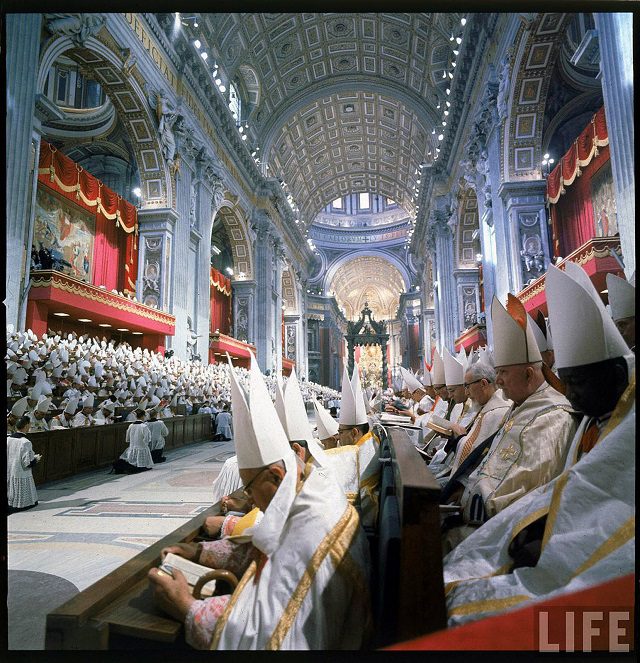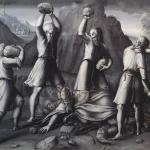
This was originally a posting of exchanges that took place on my public Facebook page, in a thread regarding Ross Douthat and his book, To Change the Church. A friend of mine was criticizing (with great vigor!) my critique of Ross Douthat from two years ago: long before his book came out. He objected to my posting his words here, so I have removed them and will now briefly paraphrase (in brackets) his objections, that I counter-respond to. Ross Douthat’s words will be in blue.
***
[I was accused of completely missing (and hence, misrepresenting) the point of Douthat’s 2015 Erasmus Lecture that was reprinted in First Things in January 2016]
There is no question that in the past quotation, Douthat bashed Vatican II itself: precisely in the manner that reactionaries do. I didn’t intend to engage in an in-depth critique of that. I am simply documenting it, as something most Catholics understand to be self-evidently wrong.
Whether it is an “injustice” or not. I have documented the fact that a Protestant reviewer wrote the statement: “I don’t think Douthat could’ve written a better apologetic for Protestant arguments against the papacy.” It sure gave this Protestant comfort in his Protestant belief in the non-necessary, arbitrary nature of the papacy itself. We are causing the weak to stumble, in other words.
I think that’s very troubling that his book is being perceived (rightly or wrongly) in that way. And to me it’s perfectly understandable, because in these respects he is thinking precisely like Protestants do: something I’ve noted that reactionaries do, for over 20 years now.
[My friend said that I didn’t adequately consult context]
I did quote him a great deal when I critiqued him two years ago. Plenty of context . . .
[It was said that I egregiously misinterpreted Douthat’s article in First Things, and that I merely quickly ran through it to quote-mine, and that I was engaged in sloppy, shoddy research]
Fine. Now please show me how it is not the case that Douthat has attacked Vatican II in its essence. If indeed, I’m being so “sloppy” (which is entirely possible), at least I am doing it in defense of the Holy Father, and not tearing him down every day.
On pp. 98-99 [of his new book, To Change the Church], Douthat wrote about Pope Francis’ alleged teaching on marriage and family:
For a pope to contradict his predecessors so flagrantly, to break with a tradition so deeply rooted and recently reaffirmed, was supposed to be literally impossible — precluded by the nature of papal infallibility, prevented by the action of the Holy Spirit, and unimaginable given the premises that conservative Catholics brought to these debates. Indeed, if a pope could bless communion for some adulterers using premises explicitly rejected by his immediate predecessors, it would suggest that the Orthodox and Anglicans were closer to the mark in their view of church authority than the Catholics — that the pope might be a fine symbol of unity, but that as the last word on faith and morals his authority had been rather exaggerated for at least a thousand years.
This is a lie; therefore it bashed Pope Francis. He has never countenanced giving Holy Communion to unrepentant adulterers, and the “hard cases” he has brought up are no different from what Pope Benedict said. Therefore, it’s a lie that he is “using premises explicitly rejected by his immediate predecessors.”
There is no contradiction; no break in tradition. Douthat falsely thinks so because he is operating on false premises, and is thinking like reactionaries, who think that all popes since 1958 have been contradicting previous tradition. That’s why they are now starting to up their attacks on Benedict: previously their darling. They’re beginning to adjust their thoughts to an even more radical mindset: akin to the sedevacantists.
Hence, it is alarming that Douthat and Lawler attack Vatican II directly, because it is indicative that they are on the slippery slope of reactionaryism.
I’ve been studying the reactionaries and debating them for over twenty years. That’s how I can make such remarks about them, and why I see similarities in the pope-bashers. I can’t unknow what I know from long years of experience.
[I was told that Douthat did not directly attack Vatican II; he was merely recounting the disastrous implementation of it over fifty years]
You have criticized my critique of Douthat’s Jan. 2016 First Things article.
Okay; here are the facts of the matter. Because it’s a bogus, silly charge, I have to take my time counting up words, to overthrow it.
Douthat’s article was 5302 words. I cited 1348 of those words, or 25% of the whole, in my reply article. These 1348 words comprised 30% of my own article, which was 4498 words.
That is hardly quote-mining or ignoring context: to cite 25% of an opponent’s 5300-word article: 6 pages out of 24. I quoted from his article the equivalent of one of my 1000-word articles for National Catholic Register + 348 more words. That’s a typical Armstrong color-coded back-and-forth dialogue format (very well-known to my readers): of which I have posted many hundreds: tons of my opponent’s words with a link to their piece for full context. Many times I will cite all my opponent’s words, but at over 5000 words, that wasn’t possible.
I called no one a heretic. That’s absolutely asinine, and proves that you obviously don’t read my words very carefully, or understand them. And here you are railing against my alleged sloppiness!? I don’t call reactionaries heretics (I call them Catholics, which is why I deliberately included “Catholic” in my coined term, “radical Catholic reactionary”). Nor do I call reactionaries schismatics (many others do). Occasionally I call them quasi-schismatics. I don’t call SSPX heretics. I call them schismatics (though some disagree that they are). I call sedevacantists heretics. And that may be technically incorrect, if you ask a canonist. I don’t claim certainty for that.
Nor do I call Lawler and Douthat heretics or schismatics or even reactionaries. I call them orthodox Catholics and say that they are thinking like reactionaries in two key respects (Vatican II-bashing and pope-bashing). I was quite deferential and kind to Lawler, I think, in our short interactions before he decided to split: far more charitable by any measure than his rather acerbic attitude in his interactions with me.
The key portion I cited in disagreement was this:
Conservative Catholics need to come to terms with certain essential failures of Vatican II. (italicized in his original).
He then goes on to chronicle all the nonsense that followed the council, the “spirit of Vatican II” etc. Everyone understands that. I don’t object to that analysis because it’s a truism and unarguable.
But he does blame the council itself (unlike what you claim he was arguing). He wrote, shortly afterwards:
[A] major part of Vatican II’s mission was to equip the Church to evangelize the modern world, and that five decades is long enough to say that in this ambition the council mostly failed. Since the close of the council, we’ve seen fifty years of Catholic civil war and institutional collapse in the world’s most modern (and once, most Catholic) societies, fifty years in which only Africa looks like a successful Catholic mission territory, while in Asia and Latin America the Church has been lapped and lapped again by Protestants. The new evangelization exists as an undercurrent, at best, in Catholic life; the dominant reality is not new growth, but permanent crisis.
This doesn’t mean the council was a failure in its entirety, or that arch-traditionalists are right to condemn it as heretical, or (as more moderate traditionalists would argue) that the council itself was primarily to blame for everything that followed. The experience of every other Christian confession suggests that some version of the same civil war and institutional crisis would have arrived with or without the council.
But we need to recognize, finally, that for all its future-oriented rhetoric, Vatican II’s clearest achievements were mostly backward-looking. [my bolded emphases]
He nuances it, as he well should, but it is still the case that he is blaming in some measure VCII itself. This is wrong. It doesn’t even make logical sense. The Council called for more evangelization and lay participation in many ways, and engaging the modern world in terms it can understand.
He says the council “failed” in this ambition. But it no more failed than Jesus did when He said to love others as He loved us. The council gave the good and true advice and we failed to put it into practice. We are to blame, not the council, and not Jesus when He commands difficult things that we never live up to.
But Douthat clearly blames the council, because he says it wasn’t “a failure in its entirety” by which it follows that he thinks it failed in part. And he says it had “essential failures.” I’m saying it didn’t fail at all. Again, we failed, as is always the case. A council can’t fail in giving good and wise and helpful advice. Only people can fail at implementing same. The only way a council can fail is in teaching false doctrine (or in a lesser way, by giving crappy, bad advice), and we believe that ecumenical councils could never bind Catholics to falsehood. Vatican II taught the most about conciliar infallibility of any council.
As I showed in another [Facebook] post today, noting reactionary site One Peter Five‘s review of the book: it shows that Douthat played the “ambiguity” card in the book, which is straight out of the reactionary playbook. Here is Maike Hicksons’ statement, with several Douthat citations:
While further discussing the council, Douthat shows how ambiguities were deliberately placed into its documents – “because the Council had many authors, and because many of those authors were themselves uncertain about what could be changed” (p. 23) – so that in some way, two different readings, the liberal as well as the conservative, were “in some sense intended by Vatican II.” With regard to the topic of religious liberty, for example, “there seemed to be a plainly-revised teaching, but even where there wasn’t there was a new language, and the apparent retirement of older phrases and rhetoric and forms.” Importantly, the author adds: “And this linguistic shift inevitably suggested a new teaching, to those who wished to have one, even as it stopped short of offering one outright.” [italicized word was, it appears, in Douthat’s book]
That’s going after the council itself, on a much more subtle level. As I stated in the other post:
It wanted to have it both ways; it was two-faced, equivocal (in plain English: dishonest, and in the end, anti-traditional; in conflict with past Catholic tradition).
Critics of Pope Francis are now saying exactly the same thing about him: he’s sneaky, “jesuitical’; won’t say what he really means; if he expresses something orthodox, it’s a mere fooler to keep the people hoodwinked, etc., etc. What goes around, comes around.
Douthat is thinking in a flawed way about an ecumenical council as well as a pope. He’s doing it, and so is Lawler (which I have documented as well), so it is quite proper that I would point out these striking, alarming similarities.
His thought may have evolved in the last two years (further right: towards the reactionaries), but there it is. He’s saying that the council deliberately intended to be capable of being read in both orthodox and heterodox ways.
That’s how the reactionaries have talked since 1965. And if you had studied them like I have, you would know that (and perhaps you do). Therefore, you could hardly deny that Douthat (in the book excerpts cited by Hickson) was thinking as they think (and not like Pope John Paul II or Benedict XVI would think) in this respect.
I am thankful to you for giving me this opportunity to cite even more of Douthat’s reasoning and make my existing argument much stronger than it was.
It’s possible that I am reading too much into some of his criticisms of Vatican II, which is why I will keep a close eye on further developments, but I believe that it’s also true that he has a different view than the last two popes, and that is worrying. Given such a choice, I go with the popes, not Douthat. They know a lot more than he does, and they have the charism that he doesn’t have.
[For a continuance of this discussion with others, including Karl Keating (very vigorous exchanges indeed!), see my Facebook cross-posting of it]
***
Photo credit: Vatican II: November 1962. Photo posted by “manhhal” (5-14-16) [Flickr / CC BY 2.0 license]
***













